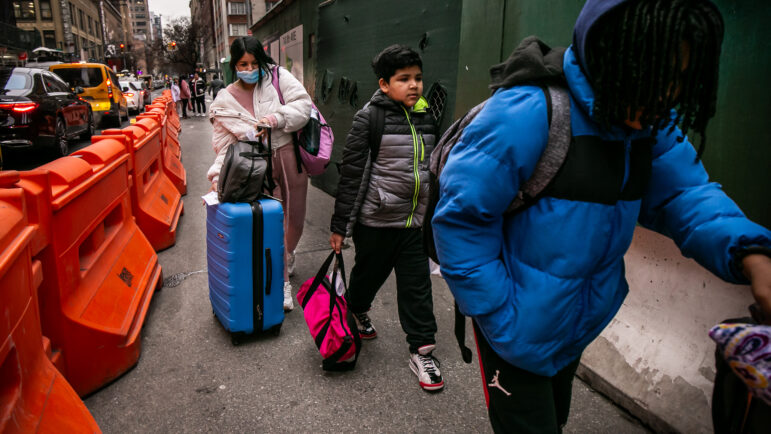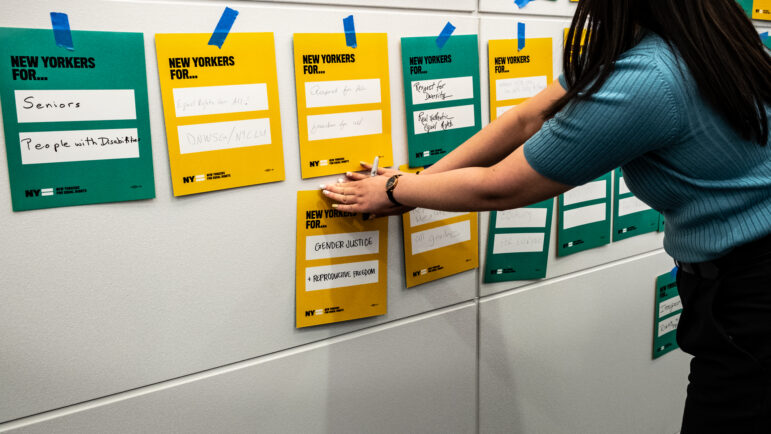For years, Community School District 19 in the heart of the mostly low-income East Brooklyn has been plagued by low reading and math scores, poor attendance and overcrowding. With two separate schools, PS 7 and IS 171, forced to share one building, overcrowding is so bad, students in kindergarten and sixth grade are bused out each day to other area schools.
The time has finally come for a group of East New York parents to take matters into their own hands. Led by the tenacious activism of the petite and energetic Maria Jaya-Vega, and determined to improve their school district and spare some students the headache of nearly 200 percent school overcrowding, come September these parents will have a school of their own–literally.
Last April, Jaya-Vega, along with other neighborhood parents and local community development organizations, received word that their plan to start the Cypress Hills Community School (CHCS), a teacher/parent-run alternative school for District 19 students, was approved by the small schools incubator New Visions Foundation for a $15,000 planning grant. They will soon be given final approval by the Board of Education, along with a second grant of $50,000.
After a year of negotiations, the city is giving the experimental school use of three classrooms and an office inside of neighboring PS 224. It’s a temporary place to begin to set up their experiment, beginning with only 54 students in grades K through 3. But the three-year long-term projection for CHCS is to develop a local site large enough for 300 students in grades K through 8-and they have support from District 19’s superintendent–a crucial endorsement that bodes well for the experiment’s staying power.
The new school is the first in New York to test non-bureaucratic, parent-teacher-run public school administration in the city. “The Cypress Hills School is going to be joining two forces–the parents and the teachers,” says Jaya-Vega, who has become a familiar face around the school board’s offices. “Because those are the groups that share the same goals. As a parent, I want my son to have an excellent education. Most teachers do want to provide [that] as well.”
“Parents have been involved in every aspect of planning for this project,” explains Megan Chambers of the Cypress Hills Local Development Corporation, which helped organize the effort. “They are a majority on the planning team and have done everything from designing job descriptions to interviewing candidates, to making presentations to the community school board. They will have real control.”
_______
Jaya-Vega grew up in Ecuador. After coming to the United States in 1981, she spent nearly a decade being a housewife.
Her first foray into activism came eight years ago, when her 5-year-old son Jimmy was going to be sent to special ed because he was hyperactive and had a speech problem. Vega took him for a private evaluation and found out that he simply needed speech therapy.
“I realized that I have to learn how to defend myself and my child,” she says, in a slow, careful meter that reflects circumspection–not any problems with English. She mastered the language by taking adult education courses at York College. Later, after having her second child, she decided to get a job to help support the family and began working for nonprofit organizations, eventually landing a job with the Cypress Hills LDC. At about the same time, she became involved with the PTA and soon realized that her energy and commitment were a too-rare commodity.
_______
Part of what fuels Jaya-Vega is anger. She contends that in the past, District 19 had been the city’s dumping ground for teachers who couldn’t be placed anywhere else–a problem that made learning especially difficult for many students for whom English was a second language. Consequently, the Cypress Hills Community School will emphasize “language acquisition,” a dual-language program where students learn to become proficient in English and Spanish. “Students here will retain their own language and also learn a new one,” says Jaya-Vega.
The language acquisition program is as much about heritage and self-esteem as it is about language. “One of the themes of the school is to start creating new leaders,” she says. The school plans an interdisciplinary style of education, with an emphasis on lab work to relate subjects to real life.
For Marjorie Suarez, a parent member of the CHCS planning committee since last February, there was never any question that her 6-year-old daughter Marisol would be a part of the new project. Even though her daughter is currently in a gifted program at a local school, it still fails to meet her expectations. “In her school, they go straight to the text. But [at CHCS] there will be a non-traditional approach to teaching. The kids will deal with hands-on experience before textbooks. That is motivational learning and what I try to do with her at home.”
Without the traditional hierarchy of a principal and assistant principal, a small planning team of parents, teachers and community members will create the school’s curriculum and govern its budget and scheduling. The school will have two co-directors-one parent, Jaya-Vega, and one teacher, Sheryl Brown, currently a staff developer at PS 65.
Though Brown has a degree in supervision and administration–what she calls a “principal’s license”–she says she will still spend time in the classroom. According to the co-directors of the new project, the school will create an 11-member council made up of six parents and five teachers to oversee administration. The council will determine the direction of the school and seek help from the school district only when a serious situation cannot be resolved.
The biggest challenge for the new school, however, will likely be finding ways to keep parents involved. Jaya-Vega and Brown both admit that the school’s success or failure will have much to do with the commitment from parents. “We hope things will work on a volunteer basis. We assume parents are going to get involved and volunteer time to the school. At least at this point, we have groups of parents that are totally involved and totally committed,” says Jaya-Vega.
Children of all ethnic backgrounds will be accepted into the Cypress Hills Community School, but 80 percent must come from District 19–which is heavily Latino and African-American. “Whoever sends their child here is going to be clear about what to expect from the school, and will know that they are going to be an active part of the education of their child,” says Jaya-Vega. But this plan, she says, is for everyone. “Of course, our mission is not only to educate the student but parents also. We will encourage many of them to volunteer time to GED or ESL classes,” she adds. “Because in the long term, what we really hope for is to build a strong community.”
Zhanna Agran is a City Limits intern.








